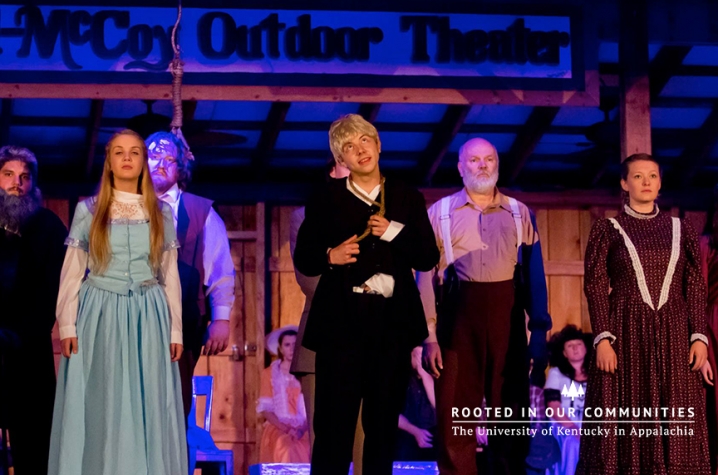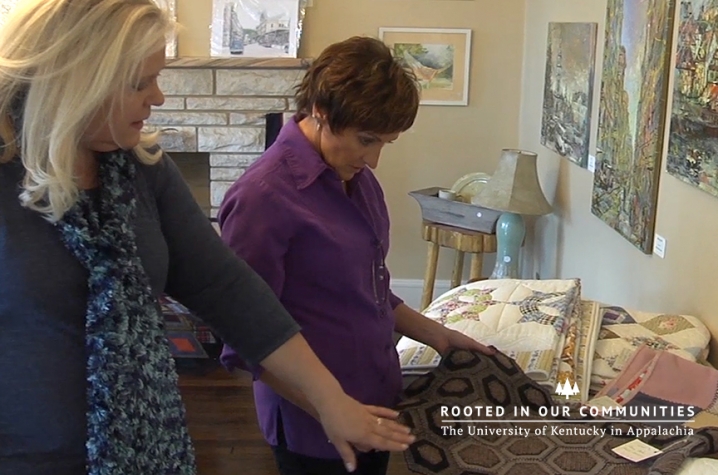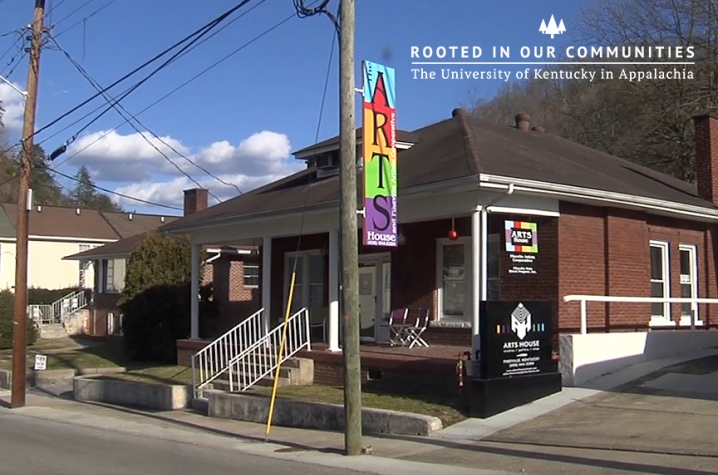Nation's First Cooperative Extension Fine Arts Program Empowers Individuals, Communities
Video Produced by UK Public Relations and Marketing. To view captions for this video, push play and click on the CC icon in the bottom right hand corner of the screen. If using a mobile device, click the "thought bubble" icon in the same area.
LEXINGTON, Ky. (April 29, 2015) — Stephanie Richards remembers the exact moment she decided to move from Chicago back to her hometown in Pike County, Kentucky.
"I was on stage one night in a horrible play doing a bad job, and it was like God called me up. It was as clear as the phone ringing right now and me going 'Hello?' And it was God saying it's time to go home. I thought God was obviously confused," she said.
Richards, an actress, director, and educator born in Elkhorn City, Kentucky, studied theater at the University of Kentucky and then spent two decades perfecting her craft and building a successful career across the country before she stepped into a role she never expected to play: the nation's first fine arts extension agent, right in the rural Kentucky county where she grew up. She knows firsthand how art can transform and empower individuals and communities. And she's drawn on her years as a working artist to launch the country's fine arts extension program, which provides arts education, supports artists as entrepreneurs, and stimulates the local community and economy.
UK's cooperative extension program, inherent to the school's mission as a land grant institution, was established in 1914 to extend the knowledge and resources of the university throughout the state. While the program has historically focused on programs related to agriculture and family sciences, the Cooperative Extension Fine Arts Program facilitates arts opportunities that stimulate creativity, promote participation, and recognize artists, arts educators, and arts supporters of all levels and mediums. Founded in 2006 as a collaboration between the UK colleges of Agriculture, Food and Environment and Fine Arts, the program has since expanded to Greenup and Whitley Counties, which now have their own fine arts extension agents.
For Richards, the program isn't about developing art or artistic talent in her community but creating new space and fostering a sense of worth, both personal and economic, for the talent that already exists, ranging from oral traditions to music to quilting.
"The art was already here," she said, explaining that arts traditions are so engrained in local culture and personal identities that many people take their own skills for granted. "Our people are very rich in our heritage of storytelling. So you focus that and put it on stage and don't mess with it. That's what I say all the time — my biggest job is not to screw something up, just stay out of the way and let it happen."
In the nine years since its establishment, the Pike County Extension Fine Arts Program has grown to support artists and arts programs for all ages and mediums throughout the county. Blood Song, the original play about the Hatfield and McCoy feud, is in its third season. A half-million dollar black box theater in Elkhorn City houses the Artists Collaborative Theater, which Richards describes as the "the most award-winning theater in the state of Kentucky, as far as we know." Its free children's theater program serves around 40 children five days a week, including transportation, even though it's technically only designed for two days. The children produce a play each semester, complemented with a curriculum and reading skills program, that reaches 4,000 kids when they go on tour.
Richards recalls how discovering theater allowed her to discover how her own mind works and cultivated imagination, critical thinking, and acceptance — phenomena she sees in many of the people she works with.
"Acceptance is probably one of the biggest things. Everyone is good. Everyone is doing their best. How can we fit them in? That's probably one of the biggest things we practice. Everyone has strengths," she said. "It's very inclusive. No one is judged, no one is set back."
She describes theater as a vehicle to teach life skills like problem-solving, teamwork, budgeting, and self-confidence, among participants of all ages.
"Theater and the arts, theater especially, teach you how to walk into a situation, see the problem, identify the problem, fix the problem, work with the team and have a solution," she said. "If you can walk on stage and succeed, there is so much that you know you can do from now on — having something inside you and knowing it has to come out. And I can give my kids a structured, safe environment, and my senior citizens in the program as well."
Sarah Haynes was one of those kids. Born in Pike County, she joined the Artists Collaborative Theater at age 10; in May she'll be graduating from UK with a Bachelor of Health Sciences degree in communications sciences and disorders and minors in theater and psychology. She said that her opportunities for artistic experiences were constrained in her rural setting until Richards "moved back home to Eastern Kentucky with a vision to create a community theater that would embrace young people and challenge them to set goals."
"Joining Artists Collaborative Theatre Inc. gave me the opportunity to engage in a community that would challenge me, encourage me, and set me up for success,” Haynes said. “Participating taught me leadership, adaptation, and diligence — each of which transcends into who I am as an individual and who I am as a student at the University of Kentucky."
Haynes has been accepted at both the University of Kentucky and the University of Louisville to complete a Master of Science degree in speech and language pathology.
"I believe that without the influence of this incredible theater I may have never discovered my true potential, talents, or unique skill set," she said.
In addition to creating arts opportunities for youth, the Pike County Extension Fine Arts Program also supports working artists in their entrepreneurial efforts. Richards sees this as a key link between the personal and economic value of the arts.
"Let's figure out how to pursue the arts intelligently. Let's figure out how to not be a starving artist and then have to go do something else," she said. "Lets figure out how to do arts administration or arts education or how to piecemeal your own career."
In practice, this involves everything from helping artists understand tax deductions and write business plans to developing an online art store that provides an easy infrastructure for artists to sell their work. Richards also supports the newly opened Pikeville Arts House, a gallery, studio and workshop operated by the Pikeville Artists Cooperative.
Paula Smith, an art teacher at Pikeville High School and adjunct art history professor at the University of Pikeville, works with the Arts House, where she shows and sells her paintings that use coal as pigment. She describes herself as a historian as well as an artist, aiming to elevate depictions of Eastern Kentucky life and the deep love of the mountains.
"I want people to know how we lived and how lucky we are to have this beautiful life, because it really is a beautiful life," said Smith.
While she's enjoyed seeing her friends and neighbors in community theater productions, she's particularly appreciative of what she's learned from Richards and the Extension Fine Arts Program about the business aspects of being a working artist.
"It gives people a way to supplement their income, but more than that it opens them up to the world," Smith said." It allows them to use the talent that they have and it also gives them some pride, because one of the things people need in their life is to know that I can do something good and people like it, whether it's music, theater, art."
Richards understands that supporting artistic entrepreneurship is just one of many ways that the arts contribute to the local economy. She says that over $500,000 in direct money has been invested in the county's art programs, including $200,000 from the Pike County government for structural upgrades to the outdoor amphitheater.
"The arts impact economy and community development the same as a local business would," she said. "Arts should be invited to the table every time community economic development is discussed. It’s a substantial piece of the pie that should be recognized every time, and I think Pike County gets that."
Going to see a theater production, she points out, involves buying tickets, gas, and probably a meal — money that's pumped back into the local economy. Similarly, putting on a production requires buying lumber, paint, fabric and food. (She jokes that the children's theater program keeps the local pizza shop in business.)
"I would really love for Pike County to be known as the arts destination," she said. "I don’t want it to be just stuff or fluff. I want it to be quality. I want it to impact lives. I want it to change lives. I want it to fix some of our social problems."
She also hopes the Extension Fine Arts Program will help young people see "that coming home is good, and that this is not just a place to get away from."
"That's one of the things I share with my students a lot. You can love this area. It's good to love your home," she said.
And not only can they love it, they can also expect to enjoy a thriving arts scene.
"We've got this half-million dollar black box community theater in the middle of a town that has a population of under a thousand people," she said. "And people just expect it to succeed now. They don’t even consider that it's not going to work."
This story is part of an ongoing series exploring how the University of Kentucky works with communities in Appalachia. Read more at Rooted in Our Communities: The University of Kentucky in Appalachia.
MEDIA CONTACT: Mallory Powell, mallory.powell@uky.edu







